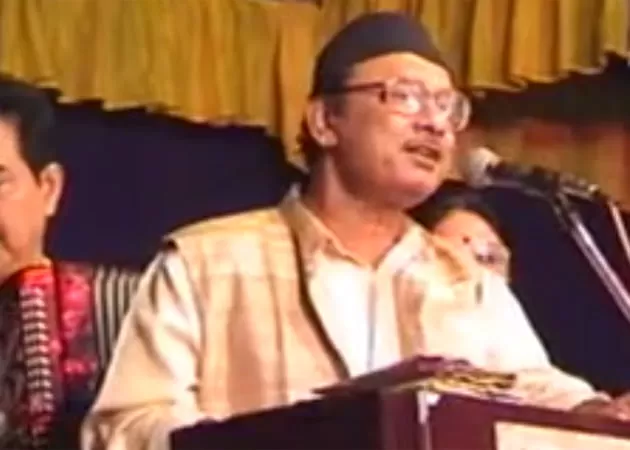ZAHEER AKRAM BORA
“ ……………. Jeutir kolate ari thoi oha Punatir tunuk tanak maat ti aaji thunok thanak kori aahe”. That was Khagen Mahanta’s protagonist afar from home remembering his little one whose last words echo in his heart while tears roll down his cheeks. It was purely chaste music of humanity which indeed was the flair of the music icon. Likewise, with Khagenda having traversed the last frontier of life, his golden voice reverberates in the hearts of millions amidst the void caused by his departure for the heavenly abode.
Aura of the native soil
Culturally speaking, Bihu – primarily Rongali Bihu – constitute the lifeline of the Assamese society. While countless generations over the centuries had been enthralled by the vigour and vitality of Bihu songs, in modern era, beyond an iota of doubt, crores across Assam have accepted folk music maestro, the late Khagen Mahanta, as the undisputed and supreme lord of Bihu songs. However, it may be a gross under-statement and under-assessment to confine the music icon to the realm of Bihu songs alone.
Affectionately called Khagen da, Khagen Mahanta’s musical canvas spread over virtually every nicety of the immensely rich folk-based music of the state as inherited from the days of the greatest son of the soil of Assam – Mahapurush Sri Sri Sankardeva. Unlike many others, Khagen da never looked for inspiration and motivation beyond the bountiful domain of traditional music for his musical compositions. Pure and unadulterated folk music, laced with rhythmic and melodious notes produced by traditional musical instruments constituted the unshakable, inimitable and matchless forte of all his creations.
It may be pertinent at this juncture to point out that Khagen da engaged himself for years together in painstaking hard work to unearth the true essence of Bihu songs in their original form. His co-workers have put it on record that, prior to his forays into the world of Bihu songs, the maestro undertook extensive and comprehensive research on the subject. For this purpose he devoted several years during which he visited numerous nooks and corners of the rural milieu with a view to comprehending Bihu songs in their traditional ambience. It is no wonder, the masterpieces on Bihu that Kahagen da created endeared him to millions across Assam.
Having been so deeply rooted in folk culture, music and life style, obviously and plainly the joy and sorrow, the hardship and struggle, the merriment and celebration of the simple rural folks found overwhelming expression in his songs. His masterpiece‘Kolore Patote Kaowri Pore’ set in a pristine rural setting is an exposition of human values in its purest form in an unassuming commoner juxtaposed against his dedication to duty as a postman. Borrowing the words of Shakespeare, ‘Kolore Patote’ is simply “music of humanity”.
Written by Keshab Mahanta and set to music by Rudra Barua, the golden voice of Khagen da has transformed ‘Kolore Patote’ into a musical gem which some have rated as among the first ten songs sung by the singers of Assam over the last fifty years. Having chosen the rich and varied folk realm as his musical domain, which indeed he strode like a colossus for decades, the rural variety of life embellished with the diverse beauty of nature like the greenery of the landscape, paddy fields, swamps, soft slushy mud, laughing streams, chirping of birds, calls of domestic animals and an abundance of agricultural imagery found overwhelming manifestation in his creations.
One is compelled to feel that, from the thematic standpoint, Khagen Mahanta was highly selective on the subject matter of the lyrics, composed by himself or by others. Ingredient of the commoner’s lifestyle, preferably rural, was virtually a requirement for Khagen da’s compositions. Unsullied beauty of nature as he saw, appreciated and worshipped since his childhood manifested itself in his numerous creations as an epitaph of his love for the native soil. Hence, almost as a rule, folk-based aroma, at times with a pastoral touch, was the hallmark of his compositions.
It is also clear as day light from his works that Khagen da always strived for perfection. He always laid utmost emphasis on correct pronunciation of Assamese words. His approach only reminds one of George Bernard Shaw who flayed the Americans as ‘corrupter’ of the English language on account of the American accent and pronunciation that finally led to ‘distortion’ in the spelling of English words. Being a perfectionist, perhaps – knowingly or unknowingly – such a fear lurked in Khagen da’s conscience or sub-conscience on account of his profound desire and commitment to uphold the purity of the Assamese language.
Coupled with his apparently avowed passion to deeply engrave the rich folk-based music in the hearts of millions, one strongly feels that the maestro always worked with a mission – to keep the people anchored to the native soil by reminding them of the bountiful cultural heritage. Beyond a shadow of doubt, it is this apparent purity of his life’s philosophy of being wedded to traditional music and the rural folk amidst country-side ambience in their natural hue that really endeared Kahgen da to crores across Assam.
Khagen Mahanta’s musical odyssey bore the halo of a long pilgrimage in the sphere of traditional music. A class by himself, Khagen da rejoiced drawing succor from the rich musical heritage with all the aura of native soil. His musical masterpieces were born in the womb of folk lore, music and culture which he worshipped with utmost devotion. Alas! The void created by his demise may be extremely hard to fill up. A standing salute to the folk music maestro by The Mileage team.







